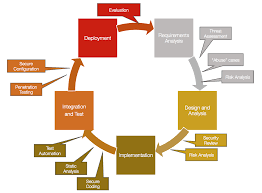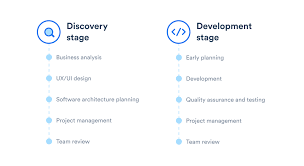Empowering Enterprises: The Evolution of Business Technology in the Digital Age
The Impact of Business Technology on Modern Enterprises
In today’s fast-paced business environment, technology plays a crucial role in shaping the success and growth of enterprises. From small startups to large corporations, businesses are increasingly relying on innovative technologies to streamline operations, enhance productivity, and gain a competitive edge in the market.
Enhancing Efficiency and Productivity
One of the key benefits of integrating technology into business processes is the significant improvement in efficiency and productivity. Automation tools, data analytics software, and cloud computing services enable companies to optimize their workflows, reduce manual tasks, and make informed decisions based on real-time data.
Improving Communication and Collaboration
Business technology has revolutionized how teams communicate and collaborate within organizations. Email, instant messaging platforms, video conferencing tools, and project management software facilitate seamless interaction among employees, regardless of their physical location. This enhanced communication leads to better teamwork, faster decision-making, and improved overall performance.
Driving Innovation and Competitive Advantage
Technology empowers businesses to innovate constantly and adapt to changing market trends. Companies that embrace digital transformation initiatives can develop new products and services more efficiently, reach a wider audience through online channels, and differentiate themselves from competitors. By leveraging cutting-edge technologies such as artificial intelligence, blockchain, and Internet of Things (IoT), enterprises can stay ahead of the curve and maintain a competitive advantage in their industry.
Ensuring Data Security and Compliance
As businesses increasingly rely on digital platforms to store sensitive information and conduct transactions, cybersecurity has become a top priority. Implementing robust security measures, such as encryption protocols, firewalls, multi-factor authentication, and regular security audits, is essential to protect data from cyber threats. Moreover, compliance with data protection regulations such as GDPR or HIPAA is crucial for maintaining trust with customers and avoiding legal repercussions.
Conclusion
In conclusion, business technology has become an indispensable asset for modern enterprises looking to thrive in today’s digital landscape. By harnessing the power of technology effectively, businesses can drive growth, improve operational efficiency, foster innovation, enhance customer experiences,
ensure data security compliance.
Key Questions and Answers on Navigating Modern Business Technology Trends
- What are the latest trends in business technology?
- How can businesses benefit from cloud computing services?
- What cybersecurity measures should businesses implement to protect their data?
- How does artificial intelligence impact business operations?
- What are the advantages of implementing a customer relationship management (CRM) system?
- How can businesses leverage big data analytics to make informed decisions?
- What steps can companies take to ensure digital transformation success?
What are the latest trends in business technology?
Business technology is a dynamic field that constantly evolves to meet the changing needs of businesses. One frequently asked question in this realm is, “What are the latest trends in business technology?” Currently, some of the emerging trends include artificial intelligence (AI) and machine learning, which are being leveraged to automate processes and enhance decision-making. Additionally, cloud computing continues to be a dominant trend, enabling businesses to scale operations and access data from anywhere. Internet of Things (IoT) devices are also gaining prominence, connecting physical objects to the digital world for improved monitoring and control. Overall, staying informed about these latest trends in business technology is crucial for organizations seeking to stay competitive and innovative in today’s digital landscape.
How can businesses benefit from cloud computing services?
Businesses can benefit significantly from cloud computing services in various ways. By leveraging cloud technology, companies can reduce their IT infrastructure costs by eliminating the need for expensive hardware and maintenance. Cloud computing offers scalability and flexibility, allowing businesses to easily adjust their resources based on demand. Moreover, cloud services enable remote access to data and applications, promoting collaboration among employees working from different locations. Enhanced data security, automatic software updates, and improved disaster recovery capabilities are additional advantages that businesses can enjoy by adopting cloud computing services. Ultimately, utilizing cloud technology empowers businesses to streamline operations, increase efficiency, and focus on driving innovation and growth in a competitive market landscape.
What cybersecurity measures should businesses implement to protect their data?
In the realm of business technology, safeguarding sensitive data is paramount to ensuring the integrity and security of operations. To protect their valuable information from cyber threats, businesses should implement robust cybersecurity measures. This includes deploying encryption protocols to secure data in transit and at rest, implementing firewalls to monitor and control network traffic, enforcing multi-factor authentication to prevent unauthorized access, conducting regular security audits to identify vulnerabilities, and staying compliant with data protection regulations such as GDPR or HIPAA. By proactively addressing cybersecurity risks through these measures, businesses can fortify their defenses and mitigate the potential impact of cyberattacks on their data assets.
How does artificial intelligence impact business operations?
Artificial intelligence (AI) significantly impacts business operations by enhancing efficiency, improving decision-making, and driving innovation. AI technologies, such as machine learning algorithms and natural language processing, enable businesses to automate routine tasks, analyze vast amounts of data quickly, and gain valuable insights. This allows companies to optimize their processes, reduce operational costs, and make more informed strategic decisions. Additionally, AI can improve customer experiences through personalized interactions and predictive analytics. By adopting AI solutions, businesses can stay competitive in a rapidly evolving market and unlock new opportunities for growth and development.
What are the advantages of implementing a customer relationship management (CRM) system?
Implementing a Customer Relationship Management (CRM) system offers numerous advantages for businesses. Firstly, a CRM system helps companies centralize customer data, enabling easy access to information such as contact details, purchase history, and interactions. This centralized database enhances customer service by allowing personalized communication and targeted marketing campaigns. Moreover, CRM systems improve efficiency by automating repetitive tasks, tracking sales pipelines, and generating insightful reports for better decision-making. Ultimately, implementing a CRM system can lead to increased customer satisfaction, improved sales performance, and stronger relationships with clients.
How can businesses leverage big data analytics to make informed decisions?
In today’s data-driven business landscape, leveraging big data analytics is essential for enterprises to make informed decisions. By harnessing the power of advanced analytics tools and technologies, businesses can analyze vast amounts of structured and unstructured data to uncover valuable insights and trends. These insights enable organizations to understand customer behavior, market dynamics, and operational performance more effectively. By utilizing big data analytics, businesses can make data-driven decisions that are based on real-time information, leading to improved strategic planning, better resource allocation, and enhanced overall business performance.
What steps can companies take to ensure digital transformation success?
To ensure digital transformation success, companies can take several key steps. Firstly, it is essential for organizations to have a clear digital strategy aligned with their business goals and objectives. This involves identifying areas that can benefit from technological advancements and outlining a roadmap for implementation. Secondly, fostering a culture of innovation and adaptability within the company is crucial. Encouraging employees to embrace change, upskill in new technologies, and collaborate across departments can facilitate a smoother transition to digital processes. Additionally, investing in robust cybersecurity measures to protect data integrity and privacy is paramount. Regularly evaluating the progress of digital initiatives, seeking feedback from stakeholders, and making adjustments as needed are vital components of achieving successful digital transformation in today’s competitive business landscape.












